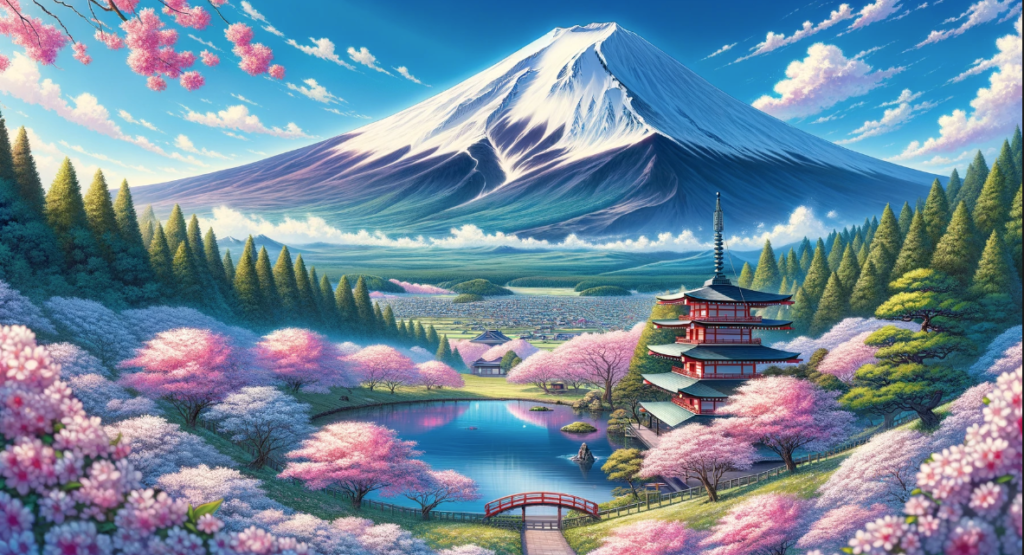
Lesson 26 Mount Fuji
Topic Question: What is the significance of Mount Fuji in Japanese culture and spirituality?
No. 1: Introduction- First, try answering the question yourself.
The instructor will provide advice on vocabulary, grammar, and expression corrections.
Sample Answer – Let’s read aloud. Instructor will check your pronunciation and accent.
Mount Fuji is not just a mountain; it’s a symbol deeply ingrained in Japanese culture and spirituality. Standing as the highest peak in Japan, it represents beauty, endurance, and the transient nature of life, reflecting the country’s aesthetic and spiritual values. Historically, Mount Fuji has been a pilgrimage site, embodying ascetic practices for Shinto and later Buddhist traditions. Its image pervades Japanese art, literature, and even daily life, symbolizing an ideal of harmony and balance. Furthermore, Mount Fuji’s regular appearance in woodblock prints and paintings has solidified its status as an icon of Japan, promoting a sense of national identity and pride. Its spiritual significance is also highlighted in countless festivals and religious ceremonies, emphasizing its role as a bridge between the earthly and the divine.
No. 2: Vocabulary Building- 5 Words to Learn and Their Meanings
- Pronounce the Words Correctly (Pronunciation Training) + Make Sentences Using the Words Instantly
- Pilgrimage (巡礼, junrei): A journey to a sacred place for religious reasons.
“Many people make a pilgrimage to Mount Fuji, seeking spiritual enlightenment.”
- Ascetic (禁欲的な, kinyokutekina): Practicing strict self-denial as a measure of personal and especially spiritual discipline.
“Ascetic practices near Mount Fuji have a long history, with monks and pilgrims seeking solitude and spiritual growth.”
- Harmony (調和, chouwa): The quality of forming a pleasing and consistent whole.
“Mount Fuji is often depicted as a symbol of harmony between nature and humanity.”
- Icon (象徴, shouchou): A person or thing regarded as a representative symbol of something.
“Mount Fuji is an icon of Japan, recognized worldwide for its majestic beauty.”
- Bridge (架け橋, kakehashi): Something that connects, supports, or links two things together.
“In spiritual terms, Mount Fuji acts as a bridge between the earthly realm and the divine, symbolizing ascension and enlightenment.”
No. 3: Key Idiom and Example Sentences
“Stand tall” (堂々と立つ, doudou to tatsu) – To maintain an upright position with pride, despite challenges or adversities.
“Just like Mount Fuji stands tall amidst Japan’s landscape, we should face life’s challenges with resilience and dignity.”
“Mount Fuji standing tall against the backdrop of Japan symbolizes the nation’s enduring spirit and cultural pride.”
No. 4: Discussion and Exchange of Opinions on the Sample Answer
Instructor: How do you think the physical and symbolic presence of Mount Fuji influences Japanese perceptions of nature and the environment?
Student: [Opinions of students]
No. 5: Free Discussion on the Topic
Let’s discuss the multifaceted role of Mount Fuji in various aspects of Japanese life, including its influence on art, religion, and national identity. How do you think the reverence for Mount Fuji reflects broader themes in Japanese culture, such as respect for nature and the pursuit of balance? Additionally, consider the impact of Mount Fuji on international perceptions of Japan. How does this mountain contribute to Japan’s image abroad, and what does it reveal about the global significance of natural landmarks?






